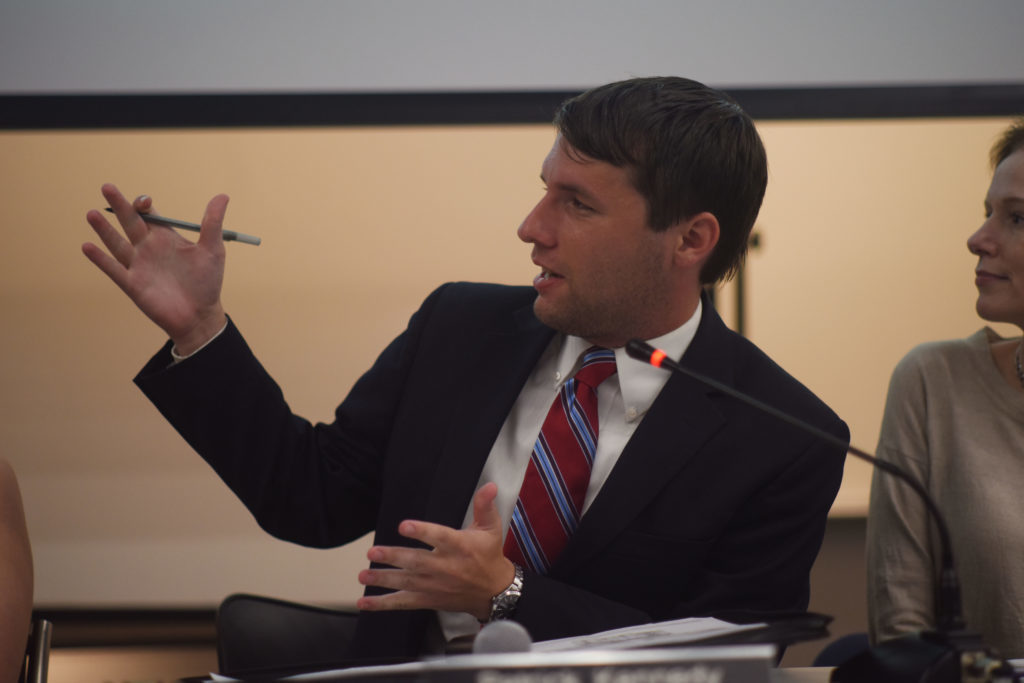A local neighborhood council decided to protest the license application of an incoming strip club proposed to open on I Street after several business owners, community leaders and the police voiced opposition Wednesday night.
Commissioners of the Foggy Bottom and West End Neighborhood Advisory Commission unanimously opposed Effigy Nightclub’s license application for its spot at 1720 I St., citing potential neighborhood disturbance and negative affect on property values. Although the location is in another ANC jurisdiction, this ANC has a statutory right to protest the application because the boundary is within 600 feet, ANC Chairman Patrick Kennedy said.
ANC resolutions are required to have “great weight” when District departments make decisions about an ANC’s area, according to D.C. law. The application will now head to the Alcoholic Beverage Control Board for consideration, Commissioner Eve Zhurbinskiy said in an email.
Emanuel Mpras, an associated counsel for Greenberg and Lieberman, LLC and the attorney representing Effigy, said the nightclub will be a new type of venue called an “ultralounge” that will appeal to both men and women.
“Yes, it is a strip club,” Mpras said. “It’s not going to be the type of club you envision when you think of that type of venue.”
Plans for the 12,263 square foot nightclub include a restaurant with a steakhouse menu, a seat capacity of 350 and total capacity of 500 people. The retailer’s license would allow for nude performances, according to a brochure handed out at the meeting.
The Dupont Circle ANC, which oversees the property, has also chosen to protest, Kennedy said in an interview.
“In view of mutual issues and concern between our two ANCs we have decided to engage in that process,” Kennedy said.
MPD Captain Kelvin Cusick said he does not approve of the club because it will require additional police who are already policing the other clubs nearby, but that MPD tries to remain neutral.
“We don’t think it’s going to be a good idea,” Cusick said. “It will be a drain on our resources.”
Mpras told community members that the club would not need police assistance. The club will not cause violence or draw noise complaints because of the targeted clientele, distance from residential areas and limited capacity, he said.
“Establishments of this type in the District don’t have problems,” Mpras said. “It’s a more sophisticated crowd – 21 and over.”
General manager of Effigy John Fiorito told commissioners that he has had prior experience with nightclubs, opening several after leaving MPD.
He added that the nightclub will not become congested because of the cover charge and seat capacity with an average age of 27 and older.
“It’s also a restaurant with a high class food menu and catered to people who want to get comfortable,” Fiorito said. “It’s not going to be a place to play loud music that is going to be causing a disturbance in the neighborhood or have people loitering about and causing fights.”
Several people representing businesses around the proposed location for the club raised objection to it at the meeting with concerns over property values dropping and public safety.
[gwh_image id=”1035139″ credit=”Madeleine Cook | Staff Photographer” align=”none” size=”embedded-img”]Eve Zhurbinskiy, an ANC commissioner, and the commission voted unanimously to protest the Effigy Nightclub’s license application due to concerns about neighborhood disturbance and affects on property values.[/gwh_image]
Zhurbinskiy said the nightclub should look into Safe Bars, a program that trains bar and club staffs to notice and handle sexual harassment in their businesses.
“As you might know there’s sort of an issue in D.C. nightlife around harassment,” Zhurbinskiy said. “Sounds like you don’t know.”
The ANC also considered the fate of a currently empty school, the Thaddeus Stevens School, which has a history of undecided use after it closed 10 years ago. The school planned to house the special needs program Ivymount before D.C. Public Schools backed out of funding the program in May.
The ANC approved a recommendation to urge the deputy mayor of education, the DCPS and the deputy mayor of economic development to allow School Without Walls to use the space and make it a public school again.
“We know that we can provide quality public school seats at that facility both for children who live inside the neighborhood and those from all across the city who send their kids to this neighborhood,” Kennedy said. “We see that the demand is there.”
Richard Livingstone, the Ward 2 Liaison for the mayor’s office, said the mayor has heard a community preference for School Without Walls to take over the space and a decision will likely come before the end of the year.
“A public school use for this space is appropriate and what we are largely considering at the moment,” he said.





